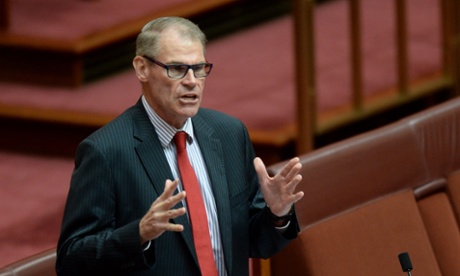John Faulkner: Labor must eliminate ‘stench of corruption’ to restore faith
ALP
elder says that the consensus of trust in politics has been broken and
the party must open up its decision making and end the fundraising arms
race to win back voters
elder says that the consensus of trust in politics has been broken and
the party must open up its decision making and end the fundraising arms
race to win back voters

John Faulkner:
there is a widespread perception that politics now is ‘a values-free
competition for office and the spoils it can deliver’.
Photograph: Alan Porritt/AAP
Labor veteran John Faulkner says his party must restore its
tradition of grassroots participation, eliminate the “stench of
corruption”, and work to end the fundraising arms race as part of a
broad effort to restore trust between major party politics and
increasingly alienated voters.
In a speech delivered in Sydney on Tuesday night, Faulkner says
Australian democracy and the practical operation of government has
existed on a broad consensus of trust – but the trust has been fractured
by the now widespread public perception that politics is merely “a
values-free competition for office and the spoils it can deliver”.
Faulkner points to a crisis of public confidence on a number of
levels, stemming from allegations of corruption through the Independent
Commission Against Corruption; the “cabal” culture of political parties
which prioritises the exercise of institutional power over contributions
from members; and a perception that special interests seek to buy
“access and influence” through political donations.
He notes that public perceptions of undue influence “can be as
damaging to democracy as undue influence itself” because those
perceptions “undermine confidence in our processes of government, making
it difficult to untangle the motivation behind policy decisions –
electors are left wondering if decisions have been made on their
merits”.
Faulkner notes that he failed the persuasion task as special minister of state under Kevin Rudd in 2008 and 2009.
Faulkner at that time pursued electoral funding and disclosure
reforms which he says “would have had at least some dampening effect on
the behaviour that is being exposed at the Icac”. Those reforms, which
would have reduced the political donations disclosure threshold to
$1,000 and required more continuous disclosure, were blocked in the
Senate.
Faulkner also acknowledges that some of his recent proposals for
democratising the Labor party have been defeated in forums such as the
recent NSW annual conference.
He says there is a widening chasm between Labor’s avowed commitment
to democracy and “our internal practice of it”. Faulkner urges
colleagues blocking proposals for democratisation to “stop clinging to
the wheel [because] you are steering us straight for the rocks”.
The speech in western Sydney on Tuesday night to the Light on the
Hill Society is a call to arms for the ALP, and for major party politics
more generally.
Of the ALP, Faulkner says the “stench of corruption which has come to
characterise the NSW Labor party must be eliminated – failing to act is
not an option”.
“The party which gave you Eddie Obeid, Ian Macdonald and Craig
Thomson; and promoted Michael Williamson as its national president must
now be open to scrutiny and its processes subject to the rule of law,”
he says.
He says Labor must democratise its decision-making, embrace community
preselections, allow statewide ballots of party members for Senate
preselections, and allow directly elected delegates at conferences.
Faulkner says Labor must take on its “Russian doll of nested
factions” and break the undemocratic exercise of power through practices
such as “binding” caucus votes. “The practice of factions, affiliates
or interest groups binding parliamentarians in caucus votes or ballots
must be banned,” he says.
He also says it is time to rework the relationship between the party
and the trade union movement. Faulkner says unions are viewed and too
often behave within party structures as institutional blocs: “Faceless
institutions controlled by union secretaries who are in turn obedient to
factional cartels.”
He says a better model would see union members voting and having a
direct say on issues without the filter of the delegation. He says:
“Influence over ALP policy should depend on the strength of your case
and the quality of your argument, not on the number of members you claim
belong to your union – a claim which, as we have seen recently, does
not always accord with reality.”
Faulkner’s point about fundraising and democratisation is more broad-ranging than an internal critique of ALP practice.
He says all rules and decisions made by political parties should be
opened to challenge in court – and that governments should make that a
condition of political parties receiving taxpayer support through public
funding.
He also says the campaign “arms race” is skewing priorities and
perceptions in major party politics. “Elections must be a contest of
ideas, not a battle of bank balances,” he says.
“And in that contest of ideas, our political parties are paramount.
In our two party system the selection of candidates and the setting of
policies within the major political parties have perhaps as great an
influence on Australia’s governance as do general elections,” he says.
“It is therefore essential that Australia’s political parties are
open, transparent and democratic – no code words, no cabals, no secret
handshakes.”

No comments:
Post a Comment